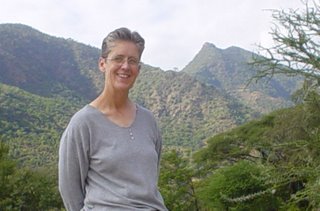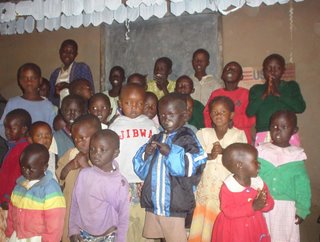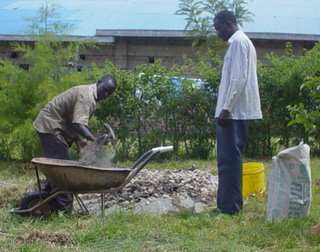I went to town early. After alighting from the matatu, I briskly walked about twenty minutes through the ever-busy downtown sidewalks to mail some birthday cards to the States. Upon entering the post office, I was glad to see there wasn’t the normal slow-moving line. I then met Deng Deng (Mark), a polite young man from my church. He had requested my help in transcribing his life story into English. The horrific atrocities that so many Sudanese refugees have experienced are heart-rending. We drank our chai as he related his personal story of tragedy.
Next, I headed to a cyber café to print and photocopy some handouts for my next teaching time at the church in Kwa Njenga. That process took longer than I’d expected, as the girl voluntarily collated them all for me. My next destination of the day was to meet Judith. On the way, I bumped into a few people I know, which naturally required at least a brief conversation with each one. Just as the bells from the Catholic church signaled that it was noon – our meeting time – we found each other at the crowded bus stop. We grabbed a #46 bus and headed to her restaurant of choice, an Ethiopian one in the Kilimani area.
As we sat down at a round wicker table to celebrate her 30th birthday, our rather aloof waiter removed its tall conical cover. The food was quite interesting and completely covered the small table. Served on a large circular bed of “njera” (fermented rice bread), it also consisted of a mound of cheese and spinach and a huge pile of “minced” beef (raw, partially done, or cooked thoroughly - - we opted for the later choice). Both of us ate from the same tray, using a torn piece of njera to grab a small amount of beef, cheese, and spinach with our fingers. The final step was to dip each clump into the small dish of “wat” (hot sauce). Our conversation – about being one of the few that succeeds in accomplishing success – was stimulating and encouraging. After browsing at the boutique next door, we walked a few minutes in the same direction before parting company. I picked up a few groceries and actually successfully read and responded to my email. My previous two attempts had been futile, as either the internet was down country-wide or Yahoo was intermittent.
It had been a good day, but a long one. The fellowship with both Mark and Judith was enjoyable and I’d accomplished several tasks. I was now tired; I headed home. I grabbed a #24 “mat” (matatu) and settled into my seat. That particular ride home takes about an hour. As we bumped over the rough roads, I noticed our driver and conductor seemed to be in even more of a hurry than is the norm. They were doing a rather creative circuit on that route, in an attempt to quickly pad their pockets for their day’s take. The conductor rushed each and every passenger that boarded or alighted. The driver took no concern for our comfort as he roughly maneuvered the twists and turns in the road.
Once we reached the Karen shops – approximately the halfway point – all but four of the passengers got off. During the long wait for the other nine seats to fill, I wondered if I’d ever reach home. As we got on our way again, it seemed that many people boarded for just a short distance. We were constantly pulling off the road to let someone on or off.
As one man boarded, the conductor roughly grabbed his young boy and hurriedly put him in the vehicle. “Simama hapa. (Stand here.)” [Children normally stand so they aren’t charged fare.]
A few other people jostled to either get in or out, as the conductor hung out the open side door, soliciting more riders. The driver roughly pulled back onto the road. The young boy, about three or four years old, looked a bit shaken by the ordeal. As he caught sight of me, our eyes locked onto one another. He was so glum as he stared intently at me. I grinned at him, while simultaneously wondering if he might cry.
For the longest time he maintained a somber look, all the while keeping his eyes glued to me. Eventually his expression softened a bit.
A man sitting between the boy and I placed his small hand onto the seat in front of him. “Shika. (Hold.)” The young boy absentmindedly complied but immediately looked back at me. He mustered a small, fleeting smile.
Then suddenly, he offered a full-fledged grin to match mine.
The boy let go of the seat in front of him and tapped his dad on the shoulder, “Baba, baba!” Immediately the man between us placed his small hand back on the seat in front of him. The way our driver was handling the vehicle, this was a prudent move on the young boy’s behalf.
The boy repeated his attempts to raise his dad’s attention by again removing his hand from the seat to tap him on the shoulder. “Baba, baba!” I’m quite sure he wanted to add, “Ona mzungu! (Dad, Dad, see the white person!)”
The man between us, oblivious to the interaction between the young boy and myself, again placed his small hand back onto the seat in front of him. The boy did not take his eyes off of me. His infectious grin remained.
By now, he couldn’t restrain himself. Once more he removed his hand from the seat in front of him. This time though, instead of tapping his father’s shoulder, his hand went to his open mouth. Behind the hand, his mouth was now in a permanent smile. He was apparently astonished, not only to see a white person, but to be in such close proximity. Pure, unqualified joy now radiated from his face.
The man between us diligently put his small hand back on the seat in front of him, kindly but firmly yet again telling him, “Shika”. And once more, the young boy absentmindedly complied. However, after only a few seconds, he removed it from the seat and returned it to his open, smiling mouth for the second time. The scene continued to repeat itself so many times; it was truly comical.
All the while, the driver recklessly hurried down the road. The conductor continued to harshly tell the passengers, “Haraka, haraka (Hurry, hurry)”. Like a game of musical chairs, people continued to board and alight. The old Kikuyu woman with her two large “kiondo” (colorful bags for carrying produce, etc.) was likely too tired to care after a day-long attempt to earn her daily bread. She uttered, “Aye,” as she difficultly squeezed her large frame past the young boy. The polio victim in front of me, with one of his legs badly shriveled, was likewise unaware of what was going on. He was perhaps contemplating how he would manage his two sizeable boxes of goods as he walked home with his homemade walking stick.
Even the young boy’s father knew nothing about our delightful, albeit silent, connection. No one – except the young boy and myself – was aware. We were alone in our enjoyment, all the while in the midst of subdued chaos.
The incident truly touched my heart. What simple ecstasy. The boy’s wonderful smile and unadulterated amazement caused me to completely forget how tired I was.
A tear or two rolled down my cheek as I thanked the Lord for such wonderfully common experiences here in Kenya.
May I never be too tired or preoccupied that I miss out on such encounters with another soul.





















